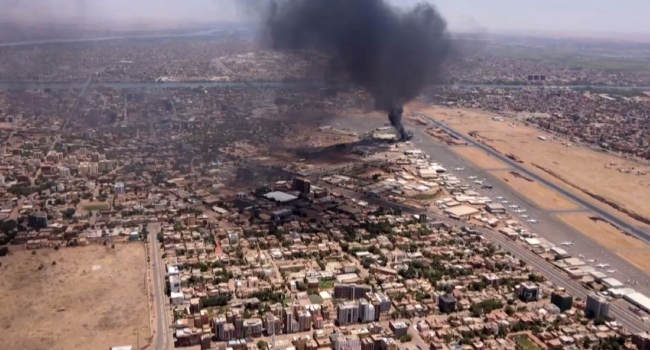Artillery shelling and air strikes claimed the lives of at least 56 people across Greater Khartoum on Saturday, according to a medical source and Sudanese activists.
Sudan’s regular army and the paramilitary Rapid Support Forces (RSF) have been locked in a power struggle since April 2023. This month, the conflict has escalated as the army fights to regain control of the capital.
RSF shelling killed 54 people and injured 158 others at a busy market in army-controlled Omdurman, part of Greater Khartoum, on Saturday, overwhelming the city’s Al-Nao Hospital, according to a medical source and the health ministry.
“The shells landed in the middle of the vegetable market, which is why there are so many victims and wounded,” a survivor told AFP.
The RSF has denied responsibility for the attack.
Across the Nile, in Khartoum proper, two civilians were killed and dozens injured in an air strike on an RSF-controlled area, according to the local Emergency Response Room, one of hundreds of volunteer groups coordinating emergency care across Sudan.
Although the RSF has used drones in its attacks, including on Saturday, the fighter jets of the regular armed forces maintain a monopoly on air strikes.
Both the RSF and the army have repeatedly been accused of targeting civilians and indiscriminately shelling residential areas.
Shelling Near Hospital
In addition to killing tens of thousands of people, the war has displaced more than 12 million and has devastated Sudan’s fragile infrastructure, leaving most health facilities non-operational.
A volunteer at Al-Nao Hospital told AFP that the facility faced severe shortages of “shrouds, blood donors and stretchers to transport the wounded.”
Al-Nao is one of the last remaining medical facilities operating in Omdurman and has come under attack multiple times.
According to the Sudanese doctors’ union, one shell fell “just metres away from Al-Nao Hospital” on Saturday.
The union reported that most of the victims were women and children and urged nurses and doctors in the area to assist in relieving a “severe shortage of medical staff.”
Fighting in the capital has intensified in recent weeks after the army launched an offensive across central Sudan, reclaiming the Al-Jazira state capital, Wad Madani, before shifting focus to Khartoum.
While the RSF remains in control of the road between Wad Madani and Khartoum, on Saturday, an army-allied militia claimed to have taken control of the towns of Tamboul, Rufaa, Al-Hasaheisa, and Al-Hilaliya, approximately 125 kilometres (77 miles) southeast of the capital.
The group, known as the Sudan Shield Forces, is led by Abu Aqla Kaykal, a former RSF commander who defected last year. He has been accused of committing atrocities against civilians, both during his time with the RSF and now as a member of the army’s forces.
Sudan remains effectively divided, with the RSF controlling almost all of the vast western Darfur region and large parts of the south, while the army maintains control over the country’s east and north.
After months of deadlock in Greater Khartoum, the army has this month broken RSF sieges on several bases in the capital, including its headquarters, forcing the paramilitary group into the city’s outskirts.
Eyewitnesses reported that Saturday’s bombardment of Omdurman originated from the city’s western outskirts, where the RSF remains in control.
A resident of a southern neighbourhood reported hearing rocket and artillery fire on the city’s streets.
Counter-Offensive and Worsening Crisis
Saturday’s bombardment occurred a day after RSF commander Mohamed Hamdan Daglo vowed to reclaim the capital from the army.
“We expelled them [from Khartoum] before, and we will expel them again,” he told his troops in a rare video address.
Greater Khartoum has been a key battleground in nearly 22 months of fighting between the army and the RSF and has been reduced to a shadow of its former self.
An investigation by the London School of Hygiene and Tropical Medicine found that 26,000 people were killed in the capital alone between April 2023 and June 2024.
Entire neighbourhoods have been taken over by fighters, while at least 3.6 million civilians have fled, according to the United Nations.
Those who remain have reported frequent artillery fire on residential areas and widespread hunger in besieged neighbourhoods blockaded by opposing forces.
At least 106,000 people are estimated to be suffering from famine in Khartoum, according to the UN-backed Integrated Food Security Phase Classification, with a further 3.2 million experiencing crisis levels of hunger.
Nationally, famine has been declared in five areas—most of them in Darfur—and is expected to spread to five more regions by May.
Before leaving office, former US President Joe Biden’s administration imposed sanctions on Sudan’s army chief, Abdel Fattah al-Burhan, accusing the army of attacking schools, markets, and hospitals and using starvation as a weapon of war.
That designation followed US sanctions on the RSF commander for his role in “gross violations of human rights” in Darfur, where the State Department said his forces had “committed genocide” against non-Arab minority groups.
This version uses British spellings, phrasing, and grammatical structures while maintaining clarity and accuracy. Let me know if you’d like any adjustments!


